- Home
- Raymond Chandler
The Lady in the Lake pm-4 Page 3
The Lady in the Lake pm-4 Read online
Page 3
Curtains moved at a lower window close to the side door Dr. Almore had gone in at. A thin hand held them aside and I caught the glint of light on glasses. They were held aside for quite some time, before they fell together again.
I looked along the street at Lavery’s house. From this angle I could see that his service porch gave on a flight of painted wooden steps to a sloping concrete walk and a flight of concrete steps ending in the paved alley below.
I looked across at Dr. Almore’s house again, wondering idly if he knew Lavery and how well. He probably knew him, since theirs were the only two houses in the block. But being a doctor, he wouldn’t tell me anything about him. As I looked, the curtains which had been lifted apart were now completely drawn aside.
The middle segment of the triple window they had masked had no screen. Behind it, Dr. Almore stood staring across my way, with a sharp frown on his thin face. I shook cigarette ash out of the window and he turned abruptly and sat down at a desk. His double-handled bag was on the desk in front of him. He sat rigidly, drumming on the desk beside the bag. His hand reached for the telephone, touched it and came away again. He lit a cigarette and shook the match violently, then strode to the window and stared out at me some more.
This was interesting, if at all, only because he was a doctor. Doctors, as a rule, are the least curious of men. While they are still interns they hear enough secrets to last them a lifetime. Dr. Almore seemed interested in me. More than interested, bothered.
I reached down to turn the ignition key, then Lavery’s front door opened and I took my hand away and leaned back again. Lavery came briskly up the walk of his house, shot a glance down the street and turned to go into his garage. He was dressed as I had seen him. He had a rough towel and a steamer rug over his arm. I heard the garage door lift up, then the car door open and shut, then the grind and cough of the starting car. It backed up the steep incline to the street, white steamy exhaust pouring from its rear end. It was a cute little blue convertible, with the top folded down and Lavery’s sleek dark head just rising above it. He was now wearing a natty pair of sun-goggles with very wide white side bows. The convertible swooped off down the block and danced around the corner.
There was nothing in that for me. Mr. Christopher Lavery was bound for the edge of the broad Pacific, to lie in the sun and let the girls see what they didn’t necessarily have to go on missing.
I gave my attention back to Dr. Almore. He was on the telephone now, not talking, holding it to his ear, smoking and waiting. Then he leaned forward as you do when the voice comes back, listened, hung up and wrote something on a pad in front of him. Then a heavy book with yellow sides appeared on his desk and he opened it just about in the middle. While he was doing this he gave one quick look out of the window, straight at the Chrysler.
He found his place in the book, leaned down over it and quick puffs of smoke appeared in the air over the pages. He wrote something else, put the book away, and grabbed the telephone again. He dialed, waited, began to speak quickly pushing his head down and making gestures in the air with his cigarette.
He finished his call and hung up. He leaned back and sat there brooding, staring down at his desk, but not forgetting to look out of the window every half minute. He was waiting, and I waited with him, for no reason at all. Doctors make many phone calls, talk to many people. Doctors look out of their front windows, doctors frown, doctors show nervousness, doctors have things on their mind and show the strain. Doctors are just people, born to sorrow, fighting the long grim fight like the rest of us.
But there was something about the way this one behaved that intrigued me. I looked at my watch, decided it was time to get something to eat, lit another cigarette and didn’t move.
It took about five minutes. Then a green sedan whisked around the corner and bore down the block. It coasted to a stop in front of Dr. Almore’s house and its tall buggy whip aerial quivered. A big man with dusty blond hair got out and went up to Dr. Almore’s front door. He rang the bell and leaned down to strike a match on the step. His head came around and he stared across the street exactly at where I was sitting.
The door opened and he went into the house. An invisible hand gathered the curtains at Dr. Almore’s study window and blanked the room. I sat there and stared at the sun darkened lining of the curtains. More time trickled by.
The front door opened again and the big man loafed casually down the steps and through the gate. He snapped his cigarette end off into the distance and rumpled his hair. He shrugged once, pinched the end of his chin, and walked diagonally across the street. His steps in the quiet were leisurely and distinct. Dr. Almore’s curtains moved apart again behind him. Dr. Almore stood in his window and watched.
A large freckled hand appeared on the sill of the car door at my elbow. A large face, deeply-lined, hung above it.
The man had eyes of metallic blue. He looked at me solidly and spoke in a deep harsh voice.
“Waiting for somebody?” he asked.
“I don’t know,” I said. “Am I?”
“I’ll ask the questions.”
“Well, I’ll be damned,” I said. “So that’s the answer to the pantomime.”
“What pantomime?” He gave me a hard level unfriendly stare from his very blue eyes.
I pointed across the street with my cigarette. “Nervous Nellie and the telephone. Calling the cops, after first getting my name from the Auto Club, probably, then looking it up in the city directory. What goes on?”
“Let me see your driver’s license.”
I gave him back his stare. “You fellows ever flash a buzzer—or is acting tough all the identification you need?”
“If I have to get tough, fellow, you’ll know it.”
I leaned down and turned my ignition key and pressed the starter. The motor caught and idled down.
“Cut that motor,” he said savagely, and put his foot on the running-board .
I cut the motor again and leaned back and looked at him.
“God damn it,” he said, “do you want me to drag you out of there and bounce you on the pavement?”
I got my wallet out and handed it to him. He drew the celluloid pocket out and looked at my driver’s license, then turned the pocket over and looked at the photostat of my other license on the back. He rammed it contemptuously back into the wallet and handed me the wallet: I put it away. His hand dipped and came up with a blue and gold police badge.
“Degarmo, detective—lieutenant,” he said in his heavy brutal voice.
“Pleased to meet you, lieutenant.”
“Skip it. Now tell why you’re down here casing Almore’s place.”
“I’m not casing Almore’s place, as you put it, lieutenant. I never heard of Dr. Almore and I don’t know of any reason why I should want to case his house.”
He turned his head to spit. I was meeting the spitting boys today.
“What’s your grift then? We don’t like peepers down here. We don’t have one in town.”
“Is that so?”
“Yeah, that’s so. So come on, talk it up. Unless you want to ride down to the clubhouse and sweat it out under the bright lights.”
I didn’t answer him.
“Her folks hire you?” he asked suddenly.
I shook my head.
“The last boy that tried it ended up on the road gang, sweetheart.”
“I bet it’s good,” I said, “if only I could guess. Tried what?”
“Tried to put the bite on him,” he said thinly.
“Too bad I don’t know how,” I said. “He looks like an easy man to bite.”
“That line of talk don’t buy you anything,” he said.
“All right,” I said. “Let’s put it this way. I don’t know Dr. Almore, never heard of him, and I’m not interested in him. I’m down here visiting a friend and looking at the view. If I’m doing anything else, it doesn’t happen to be any of your business. If you don’t like that, the best thing to do is take it down to headquarters and see t
he day captain.”
He moved a foot heavily on the running-board and looked doubtful. “Straight goods?” he asked slowly.
“Straight goods.”
“Aw hell, the guy’s screwy,” he said suddenly and looked back over his shoulder at the house. “He ought to see a doctor.” He laughed, without any amusement in the laugh. He took his foot off my running-board and rumpled his wiry hair.
“Go on—beat it,” he said. “Stay off our reservation, and you won’t make any enemies.”
I pressed the starter again. When the motor was idling gently I said: “How’s Al Norgaard these days?”
He stared at me. “You know Al?”
“Yeah. He and I worked on a case down here a couple of years ago—when Wax was chief of police.”
“Al’s in the military police. I wish I was,” he said bitterly. He started to walk away and then swung sharply on his heel. “Go on, beat it before I change my mind,” he snapped.
He walked heavily across the street and through Dr. Almore’s front gate again.
I let the clutch in and drove away. On the way back to the city, I listened to my thoughts. They moved fitfully in and out, like Dr. Almore’s thin nervous hands pulling at the edges of his curtains.
Back in Los Angeles I ate lunch and went up to my office in the Cahuenga Building to see what mail there was. I called Kingsley from there.
“I saw Lavery,” I told him. “He told me just enough dirt to sound frank. I tried to needle him a, little, but nothing came of it. I still like the idea that they quarreled and split up and that he hopes to fix it up with her yet.”
“Then he must know where she is,” Kingsley said.
“He might, but it doesn’t follow. By the way a rather curious thing happened to me on Lavery’s street. There are only two houses. The other belongs to a Dr. Almore.” I told him briefly about the rather curious thing.
He was silent for a moment at the end and then he said: “Is this Dr. Albert Almore?”
“Yes?”
“He was Crystal’s doctor for a time. He came to the house several times when she was—well, when she had been overdrinking. I thought him a little too quick with a hypodermic needle. His wife—let me see, there was something about his wife. Oh yes, she committed suicide.”
I said, “When?”
“I don’t remember. Quite a long time ago. I never knew them socially. What are you going to do now?”
I told him I was going up to Puma Lake, although it was a little late in the day to start.
He said I would have plenty of time and that they had an hour more daylight in the mountains.
I said that was fine and we hung up.
5
San Bernardino baked and shimmered in the afternoon heat. The air was hot enough to blister my tongue. I drove through it gasping, stopped long enough to buy a pint of liquor in case I fainted before I got to the mountains, and started up the long grade to Crestline. In fifteen miles the road climbed five thousand feet, but even then it was far from cool. Thirty miles of mountain driving brought me to the tall pines and a place called Bubbling Springs. It had a clapboard store and a gas pump, but it felt like paradise. From there on it was cool all the way.
The Puma Lake dam had an armed sentry at each end and one in the middle. The first one I came to had me close all the windows of the car before crossing the dam. About a hundred yards away from the dam a rope with cork floats barred the pleasure boats from coming any closer. Beyond these details the war did not seem to have done anything much to Puma Lake.
Canoes paddled about on the blue water and rowboats with outboard motors put-putted and speedboats showing off like fresh kids made wide swathes of foam and turned on a dime and girls in them shrieked and dragged their hands in the water. Jounced around in the wake of the speedboats people who had paid two dollars for a fishing license were trying to get a dime of it back in tired-tasting fish.
The road skimmed along a high granite outcrop and dropped to meadows of coarse grass in which grew what was left of the wild irises and white and purple lupine and bugle flowers and columbine and penny-royal and desert paint brush. Tall yellow pines probed at the clear blue sky. The road dropped again to lake level and the landscape began to be full of girls in gaudy slacks and snoods and peasant handkerchiefs and rat rolls and fat soled sandals and fat white thighs. People on bicycles wobbled cautiously over the highway and now and then an anxious-looking bird thumped past on a power scooter.
A mile from the village the highway was joined by another lesser road which curved back into the mountains. A rough wooden sign under the highway sign said: Little Fawn Lake 1¾ miles. I took it. Scattered cabins were perched along the slopes for the first mile and then nothing. Presently another very narrow road debouched from this one and another rough wooden sign said: Little Fawn Lake. Private Road. No Trespassing.
I turned the Chrysler into this and crawled carefully around huge bare granite rocks and past a little waterfall and through a maze of black oak trees and ironwood and manzanita and silence. A bluejay squawked on a branch and a squirrel scolded at me and beat one paw angrily on the pinecone it was holding. A scarlet-topped woodpecker stopped probing in the dark long enough to look at me with one beady eye and then dodge behind the tree trunk to look at me with the other one. I came to a five-barred gate and another sign.
Beyond the gate the road wound for a couple of hundred yards through trees and then suddenly below me was a small oval lake deep in trees and rocks and wild grass, like a drop of dew caught in a curled leaf. At the near end of it was a rough concrete dam with a rope handrail across the top and an old millwheel at the side. Near that stood a small cabin of native pine with the bark on it.
Across the lake the long way by the road and the short way by the top of the dam a large redwood cabin overhung the water and farther along, each well separated from the others, were two others cabins. All three were shut up and quiet, with drawn curtains. The big one had orange-yellow venetian blinds and a twelve-paned window facing on the lake.
At the far end of the lake from the dam was what looked like a small pier and a band pavilion. A warped wooden sign on it was painted in large white letters: Camp Kilkare. I couldn’t see any sense in that in these surroundings, so I got out of the car and started down towards the nearest cabin. Somewhere behind it an axe thudded.
I pounded on the cabin door. The axe stopped. A man’s voice yelled from somewhere. I sat down on a rock and lit a cigarette. Steps came around the corner of the cabin, uneven steps. A man with a harsh face and a swarthy skin came into view carrying a double-bitted axe.
He was heavily-built and not very tall and he limped as he walked, giving his right leg a little kick out with each step and swinging the foot in a shallow arc. He had a dark unshaven chin and steady blue eyes and grizzled hair that curled over his ears and needed cutting badly. He wore blue denim pants and a blue shirt open on a brown muscular neck. A cigarette hung from the corner of his mouth. He spoke in a tight tough city voice.
“Yeah?”
“Mr. Bill Chess?”
“That’s me.”
I stood up and got Kingsley’s note of introduction out of my pocket and handed it to him. He squinted at the note, then clumped into the cabin and came back with glasses perched on his nose. He read the note carefully and then again. He put it in his shirt pocket, buttoned the flap of his pocket, and put his hand out.
“Pleased to meet you, Mr. Marlowe.”
We shook hands. He had a hand like a wood rasp.
“You want to see Kingsley’s cabin, huh? Glad to show you. He ain’t selling for Chrissake?” He eyed me steadily and jerked a thumb across the lake.
“He might,” I said. “Everything’s for sale in California.”
“Ain’t that the truth? That’s his—the redwood job. Lined with knotty pine, composition roof, stone foundations and porches, full bath and shower, venetian blinds all around, big fireplace, oil stove in the big bedroom—and brother, you ne
ed it in the spring and fall—Pilgrim combination gas and wood range, everything first class. Cost about eight thousand and that’s money for a mountain cabin. And private reservoir in the hills for water.”
“How about electric light and telephone?” I asked, just to be friendly.
“Electric light, sure. No phone. You couldn’t get one now. If you could, it would cost plenty to string the lines out here.”
He looked at me with steady blue eyes and I looked at him. In spite of his weathered appearance he looked like a drinker. He had the thickened and glossy skin, the too noticeable veins, the bright glitter in the eyes.
I said: “Anybody living there now?”
“Nope. Mrs. Kingsley was here a few weeks back. She went down the hill. Back any day, I guess. Didn’t he say?”
I looked surprised. “Why? Does she go with the cabin?”
He scowled and then put his head back and burst out laughing. The roar of his laughter was like a tractor backfiring. It blasted the woodland silence to shreds.
“Jesus, if that ain’t a kick in the pants!” he gasped. “Does she go with the—” He put out another bellow and then his mouth shut tight as a trap.
“Yeah, it’s a swell cabin,” he said, eyeing me carefully.
“The beds comfortable?” I asked.
He leaned forward and smiled. “Maybe you’d like a face full of knuckles,” he said.
I stared at him with my mouth open. “That one went by me too fast,” I said, “I never laid an eye on it.”
“How would I know if the beds are comfortable?” he snarled, bending down a little so that he could reach me with a hard right, if it worked out that way.
“I don’t know why you wouldn’t know,” I said. “I won’t press the point. I can find out for myself.”
“Yah,” he said bitterly, “think I can’t smell a dick when I meet one? I played hit and run with them in every state in the Union. Nuts to you, pal. And nuts to Kingsley. So he hires himself a dick to come up here and see am I wearing his pajamas, huh? Listen, Jack, I might have a stiff leg and all, but the women I could get—”
I put a hand out, hoping he wouldn’t pull it off and throw it in the lake.

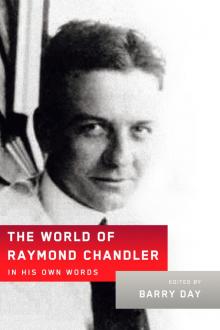 The World of Raymond Chandler: In His Own Words
The World of Raymond Chandler: In His Own Words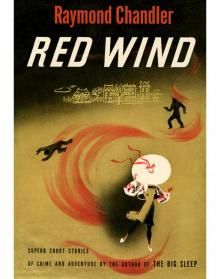 Red Wind: A Collection of Short Stories
Red Wind: A Collection of Short Stories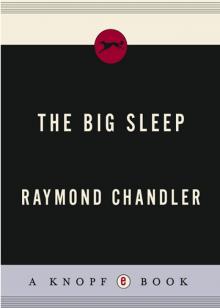 The Big Sleep
The Big Sleep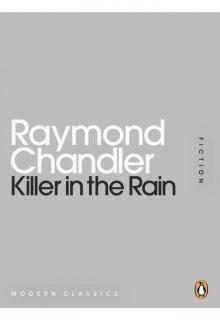 Killer in the Rain
Killer in the Rain Playback
Playback The Simple Art of Murder
The Simple Art of Murder The Bronze Door
The Bronze Door The Little Sister
The Little Sister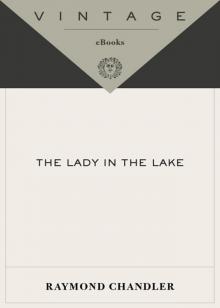 The Lady in the Lake
The Lady in the Lake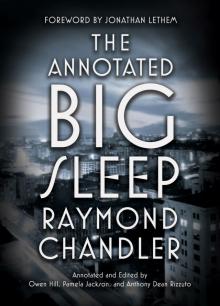 The Annotated Big Sleep
The Annotated Big Sleep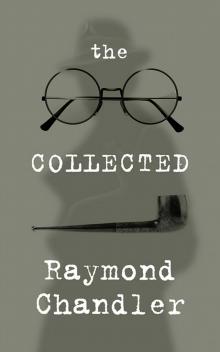 The Collected Raymond Chandler
The Collected Raymond Chandler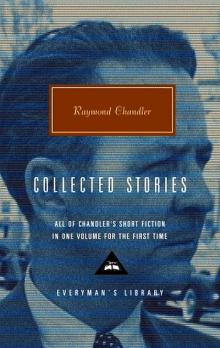 Collected Stories (Everyman's Library)
Collected Stories (Everyman's Library)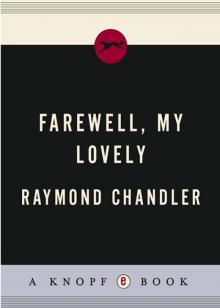 Farewell, My Lovely
Farewell, My Lovely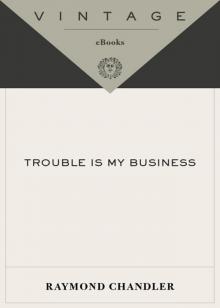 Trouble Is My Business
Trouble Is My Business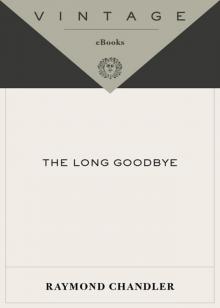 The Long Goodbye
The Long Goodbye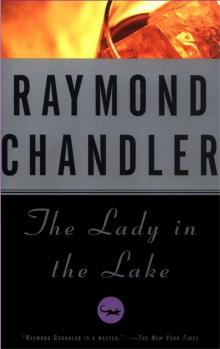 The Lady in the Lake pm-4
The Lady in the Lake pm-4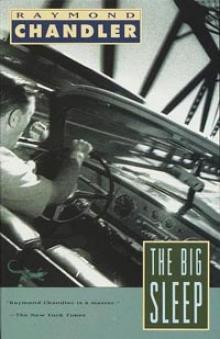 The Big Sleep pm-1
The Big Sleep pm-1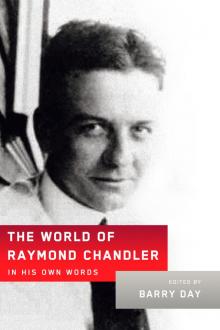 The World of Raymond Chandler
The World of Raymond Chandler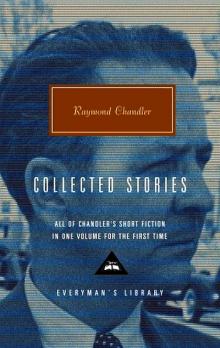 Collected Stories of Raymond Chandler
Collected Stories of Raymond Chandler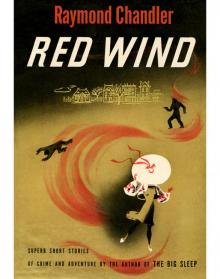 Red Wind
Red Wind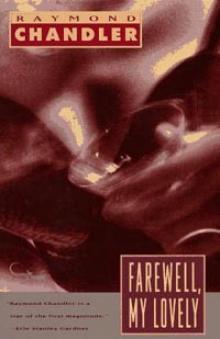 Farewell, My Lovely pm-2
Farewell, My Lovely pm-2 The Raymond Chandler Papers: Selected Letters and Nonfiction, 1909–1959
The Raymond Chandler Papers: Selected Letters and Nonfiction, 1909–1959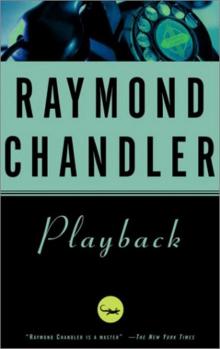 Playback pm-7
Playback pm-7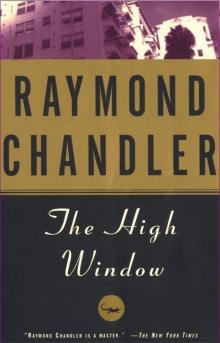 The High Window pm-3
The High Window pm-3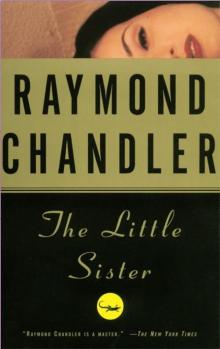 The Little Sister pm-5
The Little Sister pm-5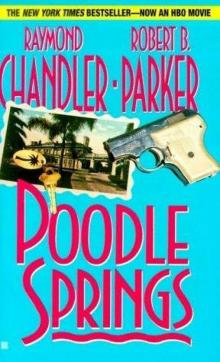 Poodle Springs (philip marlowe)
Poodle Springs (philip marlowe)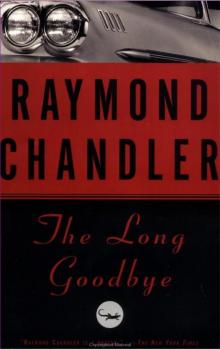 The Long Goodbye pm-6
The Long Goodbye pm-6